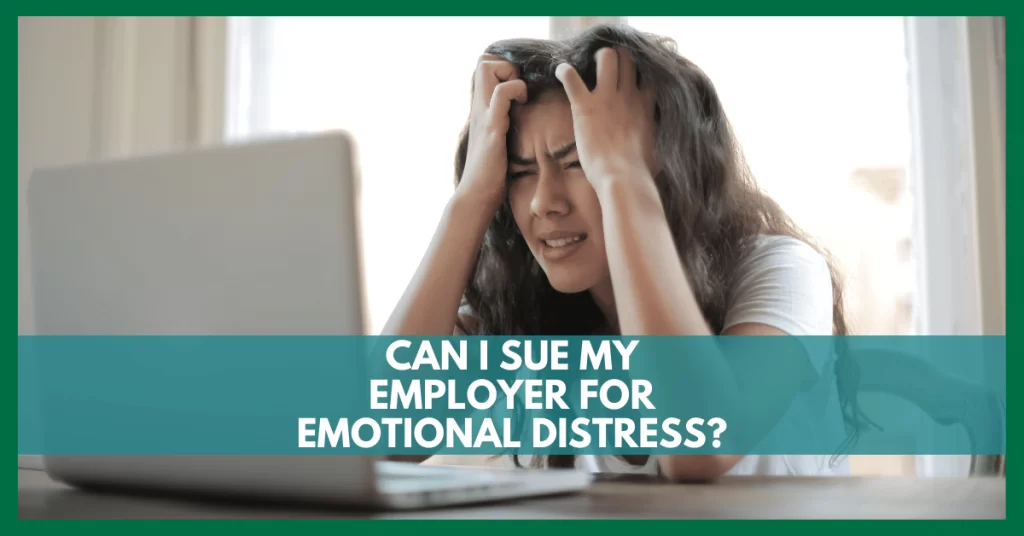Can I Sue My Employer for Emotional Distress?
Emotional distress can be a harrowing experience, particularly when it occurs in the workplace. The question that often arises is whether you can sue your employer for emotional distress. In this comprehensive guide, we will explore the nuances of emotional distress in the workplace, the legal considerations surrounding such claims, real-life cases, and crucial steps to take if you are contemplating legal action against your employer.
Understanding Emotional Distress in the Workplace
What Constitutes Emotional Distress at Work?
Before delving into the legal aspects, it’s vital to grasp what emotional distress entails in a workplace context. Emotional distress refers to the psychological harm an individual suffers due to specific events or actions, often leading to symptoms such as anxiety, depression, or even physical ailments. In the workplace, emotional distress can stem from various sources, including harassment, discrimination, or hostile work environments.
It’s essential to differentiate between general workplace stress and actionable emotional distress. While workplace stress is common and can result from job demands, emotional distress becomes legally significant when it is a direct consequence of your employer’s actions or negligence.

Recognizing the Impact
Emotional distress at work isn’t merely a matter of feeling overwhelmed or stressed; it can have severe consequences for an employee’s well-being. It can manifest as a constant state of anxiety, fear, or even physical symptoms like headaches or stomachaches. Moreover, the impact of emotional distress can extend beyond your personal life and affect your job performance.
When employees experience emotional distress, their productivity and overall mental health can suffer. This makes it crucial to address the issue promptly, whether through internal channels or, in some cases, legal action.
Legal Considerations for Suing Your Employer
Employer Liability
To determine whether you can sue your employer for emotional distress, it’s essential to assess employer liability. Employers can be held liable for emotional distress caused to employees under specific circumstances. Liability may extend not only to the employer but also to supervisors or coworkers, depending on the nature of the distress.
Typically, employer liability arises when an employer’s actions or negligence contribute to emotional harm. It’s crucial to consult with an experienced employment attorney to evaluate whether your case meets the criteria for employer liability.
Elements of an Emotional Distress Claim
Successfully suing your employer for emotional distress requires fulfilling several key elements. These elements typically include:
- Duty of Care: Establishing that your employer owes you a duty of care, which implies a responsibility to provide a safe and healthy work environment.
- Breach of Duty: Demonstrating that your employer breached this duty through actions or negligence.
- Causation: Proving that the breach of duty directly caused your emotional distress.
- Severity: Showing that the emotional distress you experienced is severe and significant.
- Negligence or Intent: Determining whether the employer’s actions were negligent or intentional, as this can impact the type of claim you pursue.
Available Legal Remedies
In emotional distress claims against employers, several legal remedies and compensation options are available. These may include:
- Compensation for Medical Expenses: If you sought medical or therapeutic treatment for your emotional distress, you may be eligible to recover these expenses.
- Lost Wages: Emotional distress can lead to missed workdays or diminished job performance. Compensation may cover lost wages due to your distress.
- Non-Economic Damages: Emotional distress claims can also seek non-economic damages, such as compensation for pain and suffering, which can vary widely based on the severity of the distress.
Real-Life Cases and Precedents
Notable Workplace Emotional Distress Lawsuits
To gain a better understanding of the complexities surrounding emotional distress claims against employers, it’s insightful to examine real-life cases where employees have pursued legal action. While outcomes can vary, these cases shed light on the legal precedents and implications involved:
- Sexual Harassment at the Workplace: Numerous cases involve employees suing their employers for emotional distress resulting from sexual harassment. Successful outcomes often hinge on providing substantial evidence of the harassment and its impact on the victim.
- Discrimination and Hostile Work Environment: Employees have taken legal action against employers for discrimination based on factors such as race, gender, or disability. Emotional distress claims in such cases emphasize the psychological toll of enduring a hostile work environment.
- Wrongful Termination: Wrongful termination cases can also lead to emotional distress claims. If an employee can demonstrate that the termination was unjust and caused significant emotional suffering, they may seek compensation.
- Retaliation and Whistleblowing: When employees face retaliation or backlash for reporting workplace misconduct or illegal activities (whistleblowing), they may sue for emotional distress. These cases often require proving a direct link between the whistleblowing and the distress.
Legal Precedents
Legal precedents, or past cases that have established principles and rules used in current judgments, play a significant role in shaping workplace emotional distress claims. Some key points regarding legal precedents include:
- Establishing Intent: Precedents have influenced the level of intent required for an emotional distress claim. For instance, in intentional infliction of emotional distress (IIED) cases, plaintiffs must prove that the defendant’s behaviour was extreme and outrageous and intended to cause severe distress.
- Determining Damages: Precedents also impact the types and amounts of damages awarded in emotional distress cases. Previous judgments serve as reference points for assessing the appropriate compensation for psychological suffering.
- Impact on Current Judgments: Courts often consider past rulings when evaluating present cases. Understanding relevant legal precedents is crucial for attorneys to build strong cases and for individuals pursuing emotional distress claims to set realistic expectations.
In light of these cases and legal precedents, it becomes evident that emotional distress claims against employers can be complex and challenging to navigate. Seeking legal counsel is often a prudent step to assess the viability of your case and receive guidance on the best course of action.
Steps to Take When Considering Legal Action
Documenting the Distress
When contemplating legal action against your employer for emotional distress, comprehensive documentation is crucial. This includes:
- Keeping a detailed journal of distressing incidents, noting dates, times, locations, individuals involved, and descriptions of the events.
- Preserving relevant communication, such as emails, text messages, or written memos that substantiate your claims.
- Seeking medical or therapeutic treatment, if necessary, and retaining records of these visits.
Thorough documentation strengthens your case and provides tangible evidence to support your claims.
Seeking Legal Counsel
Consulting with an experienced employment attorney is a critical step in the process. An attorney can:
- Evaluate the merits of your case based on the evidence and applicable laws.
- Guide you on the appropriate legal action, whether it’s filing a formal lawsuit, pursuing mediation, or negotiating a settlement.
- Represent your interests throughout the legal proceedings, ensuring your rights are protected.
- Assist in gathering additional evidence, if needed, to bolster your case.
By enlisting the expertise of an attorney, you increase your chances of navigating the legal complexities successfully.
FAQs (Frequently Asked Questions)
Q1: Can I sue my employer for emotional distress without physical harm?
A1: Yes, it is possible to sue your employer for emotional distress without physical harm. Emotional distress claims primarily focus on psychological suffering caused by your employer’s actions or negligence. While physical harm is not a prerequisite, you must provide compelling evidence linking your distress to your employer’s conduct.
Q2: What types of actions by my employer may lead to an emotional distress claim?
A2: Several actions or behaviours by your employer can potentially lead to an emotional distress claim, including:
- Harassment: Persistent harassment, whether based on race, gender, religion, or other protected characteristics, can result in emotional distress claims.
- Discrimination: Discriminatory practices in hiring, promotions, or workplace policies can contribute to emotional distress claims.
- Hostile Work Environment: A workplace characterized by hostility, intimidation, or bullying can cause significant emotional distress.
- Retaliation: If you faced retaliation for engaging in legally protected activities like whistleblowing or reporting misconduct, you may have a valid emotional distress claim.
Q3: How do I prove the emotional distress caused by my employer’s actions?
A3: Proving emotional distress resulting from your employer’s actions can be challenging but achievable. It typically involves:
- Documentation: Maintaining a detailed record of distressing incidents, including dates, times, locations, and descriptions.
- Evidence: Gathering supporting evidence, such as emails, text messages, witness testimonies, or medical records, that connect your distress to your employer’s conduct.
- Expert Testimony: In some cases, consulting mental health professionals can provide expert testimony regarding the impact of the distress on your well-being.
Consulting with an experienced attorney is crucial to strategize the collection and presentation of evidence effectively.
Q4: Are there time limits for filing an emotional distress claim against my employer?
A4: Yes, there are time limits, known as statutes of limitations, for filing emotional distress claims. These limits vary by jurisdiction and the specific nature of your claim. It is essential to consult with an attorney promptly to determine the applicable statute of limitations for your case and ensure timely filing.
Q5: What compensation can I seek in an emotional distress lawsuit against my employer?
A5: The compensation you can seek in an emotional distress lawsuit against your employer may include:
- Medical Expenses: Reimbursement for expenses related to therapy, counselling, or other necessary treatments.
- Lost Wages: Compensation for income lost due to distress-related missed workdays or diminished job performance.
- Non-Economic Damages: Awards for intangible harm, such as pain and suffering, mental anguish, and loss of enjoyment of life. The amount can vary widely based on the severity of your distress.
The specific compensation available to you depends on the circumstances of your case, and your attorney will help determine the appropriate remedies.
Q6: Can I still sue my employer if I’ve already left the company?
A6: Yes, you can sue your former employer for emotional distress even if you are no longer employed by the company. However, it’s essential to consider the statute of limitations, which may have started running when the distress occurred. Consulting with an attorney promptly after leaving the company is advisable to ensure you meet the necessary deadlines.
In conclusion, suing your employer for emotional distress is a complex legal process with various considerations. If you believe you have a valid emotional distress claim, consulting with an experienced employment attorney is essential. An attorney can help you evaluate the merits of your case, navigate the legal complexities, and guide you toward a resolution that addresses the emotional suffering you’ve endured. Remember that your mental well-being is paramount, and seeking professional support is crucial, whether you decide to pursue legal action or explore alternative solutions.




